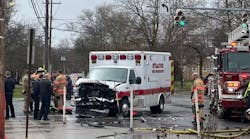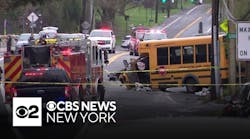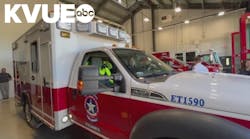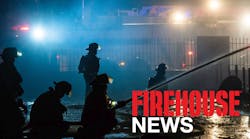Survey: Firefighters Prepared for Terror
WASHINGTON (AP) -- Worried that war in Iraq could lead to terrorist reprisals at home, the Department of Homeland Security raised the terror alert Monday to orange, indicating a high risk of attacks, and implemented enhanced security measures nationwide.
``Operation Liberty Shield'' was announced just as President Bush completed his speech giving Saddam Hussein 48 hours to leave Iraq.
The homeland security plan includes more Border Patrol officers, stepped-up patrols at seaports, airports and nuclear power plants, and increased safeguards over the nation's food supply.
Homeland Security Secretary Tom Ridge also called on governors to deploy National Guard troops or extra state police to protect bridges and other key infrastructures.
The terror alert was raised from yellow, or elevated, to orange, the second-highest level on a five-color scale. Counterterrorism officials said the decision was based on threats from al-Qaida, Iraqi operatives and freelance terrorists.
``A large volume of reporting across a range of sources, some of which are highly reliable, indicates that al-Qaida probably would attempt to launch terrorist attacks against U.S. interests claiming they were defending Muslims or the Iraqi people rather than Saddam Hussein's regime,'' Ridge said in a statement.
He also referred to ``reports of suspicious activity in and around military facilities, ports, waterways, general infrastructure and targets that are considered symbolic to U.S. power and influence.''
The FBI has increased surveillance on certain Iraqis in America and other suspected terrorists or terrorist sympathizers. Homeland Security officials said any asylum-seeking Iraqis and people from 33 other countries would be detained for background investigations.
In his address, Bush warned of the possibility of terrorist attacks and cited some of the steps the government has taken to protect U.S. citizens and interests.
``In recent days, American authorities have expelled from the country certain individuals with ties to Iraqi intelligence services,'' the president said. ``Should enemies strike our country, they would be attempting to shift our attention with panic and weaken our morale with fear. In this, they would fail.''
This is the third time the administration has raised the terror alert since the system was put in place about a year ago. It is the first time the level was raised by the Homeland Security Department, which took over the color system from the Justice Department on March 1.
U.S. counterterrorism officials say the most specific information points to possible attacks on U.S. forces in the Middle East. A recent statement from Osama bin Laden, the Saudi-born leader of al-Qaida, declared some solidarity with Iraqis, although he referred to Saddam's government as infidels.
In addition, operatives working for Iraq's Mukhabarat, Saddam's intelligence service, could attempt bombings or other traditional terrorist-style attacks. Many are thought to work out of Iraqi embassies around the world under diplomatic cover.
The State Department recently sought the expulsion of some 300 suspected operatives from more than 60 countries, but many have not been removed.
In addition, the FBI is closely watching dozens of Iraqis and others living in the United States under a wide-ranging security plan meant to deter any reprisals for a U.S. invasion, bureau officials said. The plan, a year in the making, is expected to divert several thousand FBI agents away from regular duties to focus solely on counterterrorism and security.
Some of those under the FBI's watch have been identified through ongoing interviews of up to 50,000 Iraqis. Others are suspected of having links to al-Qaida and other terror groups, possibly including the Hamas and Hezbollah organizations blamed for attacks in Israel.
The interviews with Iraqis are ``designed to obtain any information that could be of use to the United States during a possible conflict,'' Jeffrey Lampinski, special agent in charge of the FBI's Philadelphia field office, said Monday.
At the same time, the FBI sought to assure Muslims and Arab-Americans it will respond quickly to any reports of hate crimes.
Some Muslims and Arabs fear war might result in harassment or deportation. One group, the Council on American-Islamic Relations, e-mailed a ``community safety kit'' to mosques, community centers and others Monday that describes steps people can take to deal with backlash from a U.S.-Iraqi war and urging cooperation with police.
``All of us are going to be suspects,'' said Sarah Eltantawi, spokeswoman for the Muslim Public Affairs Council. ``There is just this profound sense of disappointment about what America is becoming.''
FBI spokesman Mike Kortan called the plan a prudent approach to give the country the best protection possible.
Associated Press writer John J. Lumpkin contributed to this report
On the Net:





